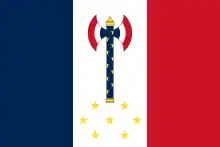This is a list of wars involving Yugoslavia.
Kingdom of Yugoslavia (1918–1943)
| Conflict | Combatant 1 | Combatant 2 | Result |
|---|---|---|---|
| Revolutions and interventions in Hungary (1918–1920) Part of the aftermath of World War I and the Revolutions of 1917–1923 |
Victory
| ||
| Austro-Slovene conflict in Carinthia (1918–1929) Part of the aftermath of World War I |
|
|
Ceasefire
|
| Christmas Uprising (1919) |
Victory
| ||
| Invasion of Yugoslavia (1941) Part of World War II |
Defeat
| ||
Socialist Federal Republic of Yugoslavia (1943–1992)
| Conflict | Combatant 1 | Combatant 2 | Result |
|---|---|---|---|
| Eastern Front (World War II) (1941–1945) Part of the World War II |
Allies Former Axis powers or co-belligerents Aerial role only |
Axis powers Axis puppet states Co-belligerents |
Victory
|
| Operation Valuable (1949-1954) |
MI6 Supported by: |
Defeat
| |
| Anti-communist insurgencies in Central and Eastern Europe (1944–1960s) |
Communist Forces: |
Anti-Communist Forces: In the Soviet Union: In the Balkans: Other European states: |
Communist Victory
|
| Angolan Civil War (1975–2002) |
Executive Outcomes (1975–91) |
Victory
| |
| Ten-Day War (1991) |
Defeat
| ||
| Croatian War of Independence (1991–1995) |
|
Defeat
| |
Notes
- ↑ Germany's allies, in total, provided a significant number of troops and material to the front. There were also numerous foreign units recruited by Germany, notably the
.svg.png.webp) Spanish Blue Division and the
Spanish Blue Division and the  Legion of French Volunteers Against Bolshevism.
Legion of French Volunteers Against Bolshevism.
References
- ↑ Toomas Alatalu. Tuva: A State Reawakens. Soviet Studies, Vol. 44, No. 5 (1992), pp. 881–895.
This article is issued from Wikipedia. The text is licensed under Creative Commons - Attribution - Sharealike. Additional terms may apply for the media files.